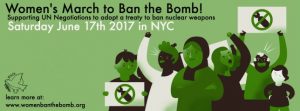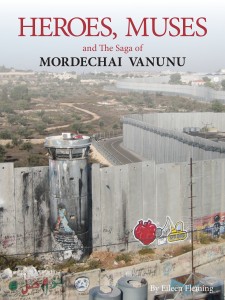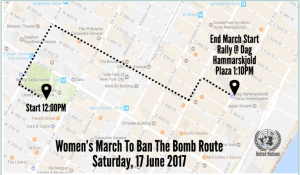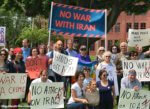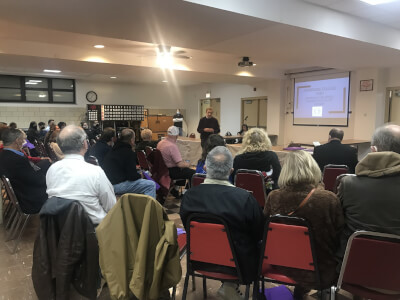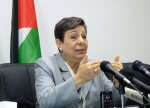The Nuclear Ban is taking it to the streets of New York City on June 17,
Led by The Women’s March Ban the Bomb who are uniting ALL genders, ages, races, abilities, nationalities, cultures, faiths, political affiliations and backgrounds to:
March and Rally for The Nuclear Ban
By Eileen Fleming
Nine countries of the World possess 15,000 nuclear weapons. America and Russia maintain around 1,800 nuclear weapons that can be launched within minutes of a Presidential order.
From March 27 through 31, the USA and Russia did not join the over 132 governments who participated in negotiations on a treaty to ban nuclear weapons at the United Nations in New York.
However, joining those 132 governments were international organizations and civil society representatives seeking a treaty to ban nuclear weapons.
Negotiations at the UN resume for three weeks beginning on 15 June, when governments will work their way through the draft text with the aim of concluding a nuclear ban treaty by July 7, that will be: “A legally binding instrument to prohibit nuclear weapons, leading towards their total elimination.”
This new international agreement will place nuclear weapons on the same legal footing as other weapons of mass destruction, which have long been outlawed.
The UN nuclear ban talks were first announced in October 2016, led by Austria, Brazil, Ireland, Mexico, South Africa and Sweden.
The United States, Russia, Britain, France, Israel and other nuclear powers persist to oppose the initiative.
However, proponents of a nuclear weapons ban have been encouraged by efforts that led to landmark prohibitions on other weapons, including chemical weapons, land mines and cluster munitions.
If a sufficient number of countries were to ratify a nuclear weapons ban, it would create the political will to respond to the ethical and moral reasons to ban nuclear weapons.
Opining the time was not right to outlaw nuclear arms, United States Ambassador to the United Nations, Nikki Haley led a group of U.N. members to boycott the nuclear ban talks.
Beatrice Fihn, the executive director of the International Campaign to Abolish Nuclear Weapons, said in a statement that the opposition expressed by Nikki Haley and her allies “demonstrates how worried they are about the real impact of the nuclear ban treaty [which would] make it clear that the world has moved beyond these morally unacceptable weapons of the past.”
More than 2,000 scientists signed this open letter:
Nuclear arms are the only weapons of mass destruction not yet prohibited by an international convention, even though they are the most destructive and indiscriminate weapons ever created.We scientists bear a special responsibility for nuclear weapons, since it was scientists who invented them and discovered that their effects are even more horrific than first thought.
Individual explosions can obliterate cities, radioactive fallout can contaminate regions, and a high-altitude electromagnetic pulse may cause mayhem by frying electrical grids and electronics across a continent.
The most horrible hazard is a nuclear-induced winter, in which the fires and smoke from as few as a thousand detonations might darken the atmosphere enough to trigger a global mini ice age with year-round winter-like conditions.
This could cause a complete collapse of the global food system and apocalyptic unrest, potentially killing most people on Earth – even if the nuclear war involved only a small fraction of the roughly 14,000 nuclear weapons that today’s nine nuclear powers control.
As Ronald Reagan said: “A nuclear war cannot be won and must never be fought.”
Unfortunately, such a war is more likely than one may hope, because it can start by mistake, miscalculation or terrorist provocation.There is a steady stream of accidents and false alarms that could trigger all-out war, and relying on never-ending luck is not a sustainable strategy.
Many nuclear powers have larger nuclear arsenals than needed for deterrence, yet prioritize making them more lethal over reducing them and the risk that they get used.
But there is also cause for optimism. On March 27 2017, an unprecedented process begins at the United Nations: most of the world’s nations convene to negotiate a ban on nuclear arms, to stigmatize them like biological and chemical weapons, with the ultimate goal of a world free of these weapons of mass destruction.We support this, and urge our national governments to do the same, because nuclear weapons threaten not merely those who have them, but all people on Earth.
In this excerpt from Pope Francis’s letter to Her Excellency Elayne Whyte Gómez President of the United Nations Conference to Negotiate a Legally Binding Instrument to Prohibit Nuclear Weapons, Leading Towards their Total Elimination, he wrote:
If we take into consideration the principal threats to peace and security with their many dimensions in this multipolar world of the twenty-first century as, for example, terrorism, asymmetrical conflicts, cybersecurity, environmental problems, poverty, not a few doubts arise regarding the inadequacy of nuclear deterrence as an effective response to such challenges.
These concerns are even greater when we consider the catastrophic humanitarian and environmental consequences that would follow from any use of nuclear weapons, with devastating, indiscriminate and uncontainable effects, over time and space.
Similar cause for concern arises when examining the waste of resources spent on nuclear issues for military purposes, which could instead be used for worthy priorities like the promotion of peace and integral human development, as well as the fight against poverty, and the implementation of the 2030 Agenda for Sustainable Development.
We need also to ask ourselves how sustainable is a stability based on fear, when it actually increases fear and undermines relationships of trust between peoples.
International peace and stability cannot be based on a false sense of security, on the threat of mutual destruction or total annihilation, or on simply maintaining a balance of power. Peace must be built on justice, on integral human development, on respect for fundamental human rights, on the protection of creation, on the participation of all in public life, on trust between peoples, on the support of peaceful institutions, on access to education and health, on dialogue and solidarity.
From this perspective, we need to go beyond nuclear deterrence: the international community is called upon to adopt forward-looking strategies to promote the goal of peace and stability and to avoid short-sighted approaches to the problems surrounding national and international security.
In this context, the ultimate goal of the total elimination of nuclear weapons becomes both a challenge and a moral and humanitarian imperative. A concrete approach should promote a reflection on an ethics of peace and multilateral and cooperative security that goes beyond the fear and isolationism that prevail in many debates today.
Achieving a world without nuclear weapons involves a long-term process, based on the awareness that “everything is connected” within the perspective of an integral ecology…
The common destiny of mankind demands the pragmatic strengthening of dialogue and the building and consolidating of mechanisms of trust and cooperation, capable of creating the conditions for a world without nuclear weapons…
And in this endeavour we must avoid those forms of mutual recrimination and polarization which hinder dialogue rather than encourage it. Humanity has the ability to work together in building up our common home; we have the freedom, intelligence and capacity to lead and direct technology, to place limits on our power, and to put all this at the service of another type of progress: one that is more human…
This Conference intends to negotiate a Treaty inspired by ethical and moral arguments. It is an exercise in hope and it is my wish that it may also constitute a decisive step along the road towards a world without nuclear weapons. Although this is a significantly complex and long-term goal, it is not beyond our reach.
Madam President, I sincerely wish that the efforts of this Conference may be fruitful and provide an effective contribution to advancing an ethic of peace and of multilateral and cooperative security, which humanity very much needs today. Upon all those gathered at this important meeting, and upon the citizens of the countries you represent, I invoke the blessings of the Almighty.
In 1987, during his first year of solitary confinement at Ashkelon prison, Israel’s nuclear whistle blower Mordechai Vanunu wrote:
The passive acceptance and complacency with regard to the existence of nuclear weapons anywhere on earth is the disease of society today.
This struggle is not only a legitimate one – it is a moral, inescapable struggle.
Already now there are enough nuclear missiles to destroy the world many times over [and] this issue should unite us all, because that is our real enemy.
Is any government qualified and authorized to produce such weapons?
Because the answer is NO, this American published my research into USA collusion in Israel’s nuclear deceptions and enshrined my interviews with Vanunu that did NOT go through Israeli Military Censors [as is required of Corporate Media who instead have ignored Israel’s nuclear deceptions] HERE
Twenty-first century nuclear weapons are unimaginably more powerful than the nuclear bombs dropped on Japan in 1945. The only guarantee against the spread and use of nuclear weapons is to eliminate them.
Taking that message to the streets is The Women’s March Ban the Bomb, a women-led initiative building on the momentum of movements at the forefront of the resistance, including the Women’s March on Washington. They are bringing together people of all genders, sexual orientations, ages, races, abilities, nationalities, cultures, faiths, political affiliations and backgrounds to March and Rally for The Nuclear Ban beginning at 12 PM through 4PM on Saturday, June 17th 2017 in the streets of New York City:
Eileen Fleming is TADN’s volunteer Health Reporter and Senior Non-Arab Correspondent
Fleming produced the UNCENSORED “30 Minutes with Vanunu” Mordechai, Israel’s nuclear whistleblower
On 8 June 2017, Eileen Fleming begins taping “This American and the USS LIBERTY Documentary”
Contact her HERE
- Vanunu still has more nuclear secrets to spill, Israeli court declares - December 29, 2021
- 9/11 and a 20th Reflection of That Day - September 5, 2021
- Mordechai Vanunu: Final Annual Update and this Writers Next Steps - June 19, 2021














